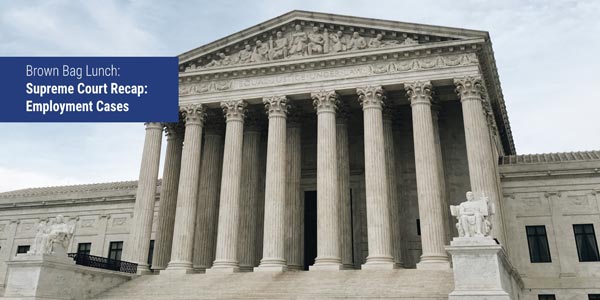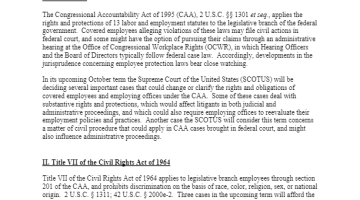I. Introduction
The Congressional Accountability Act of 1995 (CAA), 2 U.S.C. §§ 1301 et seq., applies the rights and protections of 13 labor and employment statutes to the legislative branch of the federal government. Covered employees alleging violations of these laws may file civil actions in federal court, and some might have the option of pursuing their claims through an administrative hearing at the Office of Congressional Workplace Rights (OCWR), in which Hearing Officers and the Board of Directors typically follow federal case law. Accordingly, developments in the jurisprudence concerning employee protection laws bear close watching.
In its upcoming October term the Supreme Court of the United States (SCOTUS) will be deciding several important cases that could change or clarify the rights and obligations of covered employees and employing offices under the CAA. Some of these cases deal with substantive rights and protections, which would affect litigants in both judicial and administrative proceedings, and which could also require employing offices to reevaluate their employment policies and practices. Another case the SCOTUS will consider this term concerns a matter of civil procedure that could apply in CAA cases brought in federal court, and might also influence administrative proceedings.
II. Title VII of the Civil Rights Act of 1964
Title VII of the Civil Rights Act of 1964 applies to legislative branch employees through section 201 of the CAA, and prohibits discrimination on the basis of race, color, religion, sex, or national origin. 2 U.S.C. § 1311; 42 U.S.C. § 2000e-2. Three cases in the upcoming term will afford the SCOTUS an opportunity to resolve a split in the Circuit Courts of Appeal as to whether discrimination because of “sex” in Title VII applies to discrimination based on employees’ sexual orientation or gender identity.
The two sexual orientation cases, Bostock and Zarda, have been consolidated for filing and oral argument. The case involving gender identity, R.G. & G.R. Harris Funeral Homes, will be argued on the same day.

